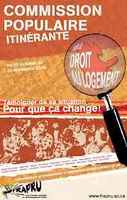Quebec, a people’s commission investigates the right to housing
A people’s commission, initiated by FRAPRU (Front d’action populaire en réaménagement urbain - People’s Action Front for Urban Rehabilitation), is investigating the implementation of the right to housing in Quebec, through public consultations in the 17 administrative regions of the province.
The Commission is made up of fourteen people of different backgrounds – academics, legal experts, representatives of community groups, and tenants of private or social housing. The commissioners’ remit is to collect witness statements from people battling with housing problems, as well as from community organisations involved in different areas. It will then fall to them to write a report for submission to the Federal and Quebec governments, in early winter 2013.
The People’s Itinerant Commission on the Right to Housing began work on 12 October 2012, in Kuujjuaq, in the Inuit territory of Nunavik, and will end on 23 November, in Abitibi, in the Anishnabe village of Lac-Simon. For FRAPRU, it was of fundamental importance to begin in the Far North, where extreme conditions of overpopulation and deterioration of housing affects more than half the population, causing or aggravating a whole series of health and social problems. The commission then followed up its enquiries in the urban centres of the South.
Putting faces to the statistics
It was the indifference of the Canadian and Quebec governments with regard to housing problems and poverty which led FRAPRU to initiate this commission. It allows us to go beyond statistics, by giving faces and words to all the diversity, the range and the urgency of people’s housing problems. These are all violations of the right to housing, i.e. the ‘right of all persons to a secure place to live in peace and dignity’ as defined by the U.N.
Holding consultations in places as diverse as Gaspé, Laval and Shawinigan shows the different facets of the problems experienced by tenants in Quebec, but there are also certain similarities. Rents, for example, are a lot lower in Gaspé, where they were $500 per month on average in November 2011, compared to Laval, where they can reach $675 per month. However, the unemployment rate is also much higher in the Gaspésie-Îles-de-la-Madeleine region, where it currently stands at 12.6%. So whatever the cause, a significant number of tenants experience payment difficulties, representing a violation of their right to housing and to a minimum standard of living.
This inability to pay has a knock-on effect on the number of people using food banks, as well as on the number of cases registered by landlords with the Housing Authority for non-payment of rent. From 2006 to 2011, this number increased by almost 15% in Rimouski.
The unsatisfactory response from governments
From 2012-2013, barely 2 500 new social housings were financed in Quebec, while there were 38 380 names on the waiting list for HLM (public social housing), and 260 070 residential households in Quebec are, according to the government itself, in urgent need of housing. Furthermore, long-term federal government grants allocated to 600 000 pre-existing HLM, housing associations and co-operatives in Canada, of which 127 000 are in Quebec, will start coming to an end, and the reductions are expected to accelerate over the next few years. This end to the financial support granted in Ottawa not only threatens the financial accessibility of this housing for its current inhabitants, but also for all those who may be in need in the future. FRAPRU is currently trying to increase the pressure on the Conservative government of Stephen Harper to agree to maintain this vital support.
The Commissioners’ report, expected at the beginning of 2013, will be delivered to both levels of government. Finally, a video describing all the stages of the commission will also be produced and used in the following months as a tool for popular education and mobilisation.
In Canada, the Federal government estimates that 1 579 559 households have urgent housing needs [1] , of which two thirds are tenants (1 044 974). During the 2006 census, Statistics Canada estimated that 697 405 of them had a median income of $11 052 for the year 2005, that their average rent costs were $751 per month and that they therefore had to spend more than half of their income on rent. [2] Furthermore, Ottawa estimates that 1.5 million people in the country are itinerants .
In Quebec, 10.6% of households (352 355) live in core housing need, of which 260 655 are tenants. Of them, 203 088 have to spend more than half their income on rent. Their median income for the year 2005 was $9 498 and their median rent costs were $608 per month.
[1] We say that a household is in core housing need when they are unable to find appropriate housing with regard to size, quality and affordability. Affordability, one of the factors used to define core need, means that no more than 30% of the household income should be spent on housing costs.
[2] Sources : Statistics Canada — 2006 Census and Human Resources and Skills Development Canada . Please note that comparable data from the 2011 census is not yet available.
For more information:
www.commissionpopulairefrapru.org
http://fr-fr.facebook.com/FRAPRU.logement
Twitter: #cpi_frapru
Lugar al que se aplica este artículo
Los(las) siguientes Traductores(as) Voluntarios(as) por el derecho a la vivienda sin fronteras de la AIH colaboraron para la traducción de este texto:


